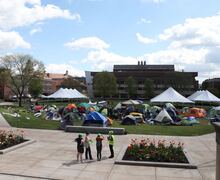Grace Sainsbury was studying in Moscow, but Russia’s invasion forced her to evacuate
Illustration by Yiwei He | Illustration Editor
Syracuse University junior Grace Sainsbury was studying abroad in Moscow, but the ongoing invasion forced her evacuation to Kyrgyzstan.
Get the latest Syracuse news delivered right to your inbox.
Subscribe to our newsletter here.
Grace Sainsbury started her Saturday night in a Moscow bar.
Sainsbury said her friends at the bar were all European, besides one other American. Her friends were getting worried about the ongoing conflict in Ukraine, and a few had even booked flights to Europe as a precaution. As they were sitting at the bar, she said, they got an alert that all of their flights home had been canceled.
The group, most of whom were international students, ran out of the bar to find an ATM.
“We just wanted to make sure we would have cash to buy tickets if we needed to,” Sainsbury said.
Russian President Vladimir Putin announced a “military operation” in the early hours of Feb. 24, two days before the students left the bar to find an ATM.

Maya Goosmann | Digital Design Director
Seth Tucker, Syracuse University’s Director of Global Safety and Student Services, confirmed to The Daily Orange in an email statement that a singular student was studying in Russia.
Sainsbury, a junior at SU studying international relations, went to Russia to further specialize in the country’s foreign relations. This semester, Sainsbury said she planned to take classes at the Moscow Institute for International Relations through The School of Russian and Asian Studies, which Tucker called a “partner organization” to SU. He confirmed to The D.O. that Sainsbury was in the organization’s Diplomacy and International Relations program in Moscow.
She wanted to study Russian as a language because she thought the country would be one of the U.S.’ largest adversaries over the next 20 years.
“I was sadly correct,” she said.
She was first contacted by the U.S. Embassy in Russia on the morning of Feb. 21. She said the message warned her of potential attacks to public places in Moscow and to stay away from busy metro stations and large crowds.
“Have evacuation plans that do not rely on U.S. government assistance,” the U.S. Embassy wrote in a security alert Sainsbury received.
The next communication would come later that day from the School of Russian and Asian Studies. She said the message she received from SRAS was “blasé,” assuring her that the situation was under control.
The next day, she said, SU contacted her.
“By this point, Putin had declared Donetsk and Luhansk ‘independent’ and was preparing to move in,” Sainsbury wrote to The D.O over WhatsApp. “I am not resentful, but it would have been a great help to my level of stress for them to reach out to at least tell me they were keeping track of the situation (prior to Feb. 22).”
Sainsbury told The D.O. in a message that Syracuse Abroad has worked hard for her throughout the crisis, and it even found a program in Bishkek, the capital of Kyrgyzstan, so she can safely leave Russia and continue her studies.
“I just wish there (had) been more communication from Syracuse from the start,” she said.

Maya Goosmann | Digital Design Director
Sainsbury was scheduled to evacuate to Bishkek Wednesday, SRAS Director Renee Stillings told The Daily Orange in an email statement. Stillings said Sainsbury will be part of a group of nearly 40 students in Bishkek.
She was scheduled to be accompanied by 12 other students, who were either studying in Moscow or St. Petersburg, and two other SRAS staff members, Stillings said.
Sainsbury confirmed to The D.O. Wednesday that she had made it to Bishkek.
“It appears that she should be able to continue some courses online from the program in Moscow and supplement this with in-person language study in Bishkek,” the SRAS director said.
In Moscow, Sainsbury said she was originally scheduled to take five classes as well as a Russian language course.
Sainsbury said many international students in Moscow believed it was not safe to stay as they feared SWIFT, a global transaction service, would be sanctioned. Their fears were realized on Feb. 27, on Moscow time, when the U.S. and its allies removed select Russian banks from SWIFT.
Sainsbury, along with many other international students, said she feared if SWIFT went down, it would be difficult or impossible to pay for anything using an international card, including food.
Additionally, the ruble has been volatile over the last week, losing nearly 26% of its original value over a few days. Sainsbury said on Tuesday that the price of goods hadn’t yet risen to meet the devaluation of the currency.
Since the outbreak of the invasion into Ukraine until her eventual evacuation from the country, Sainsbury saw changes in the city.
On Sunday, Russian police detained over 2,000 people protesting the war across the country, including in Moscow, Reuters reported. Sainsbury was told by the U.S. State Department through the Smart Traveler Enrollment Program to avoid protests.
Since the protests, Sainsbury has seen a noticeably larger police presence in Moscow. She said she saw police in riot gear with batons just standing outside of a metro station when she was out. At Red Square in Moscow, Sainsbury said she had previously seen police cars in the square, but following the protests there was an unmarked black van “waiting to take anyone away.”
Sainsbury, along with a friend of hers, a student from Italy, agreed to only speak Russian to each other to not attract attention from police.
“(It was) nerve-wracking, especially as an American,” Sainsbury said.
Though, Moscow hasn’t changed completely. “It’s also a little weird how normal life still is here in the city,” she said.
Sainsbury said now that she is in Bishkek, she does not have to worry about her personal safety, getting caught up in a protest, or her cards not working.
“I’m relieved.”
Published on March 3, 2022 at 1:19 am
Contact Kyle: [email protected] | @Kyle_Chouinard





